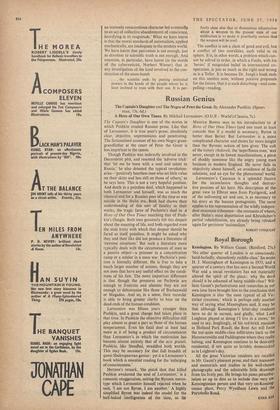Russian Genius
A Hero of Our Own Times. By Mikhail Lermontov. (0.U.P. : World's Classics, 7s.)
The Captain's Daughter is one of the stories in which Pushkin created Russian prose. Like that of Lermontov, it is true poet's prose, absolutely clear, objective, unpretentious and penetrating. The fictionalised account of his own Negro great- grandfather at the court of Peter the Great is less important in the canon.
Though Pushkin was indirectly involved in the Decembrist plot, and resented the 'adverse trick' that 'let me be born with a soul and talent in Russia,' he also detested the typical revolution- aries—`positively heartless men who set little value on their skins and less still on those of others,' as he says here. This is not a very hopeful position. And death in a pointless duel, which happened to both Lermontov and himself, was as much the classical end for a Russian poet of the time as was suicide in the Stalin era. Both had shown their understanding of this sort of fatality in their works, the tragic farce of Pechorin's duel in A Hero of Our Own Times matching that of Push- kin's Onegin. Both men genuinely felt this despair about the meaning of life, and both regarded even the stoic irony with which that despair should be faced as itself pointless. It might be asked why they and their like did not produce a literature of `extreme situations.' But such a literature more typically deals with the circumstances of man as a passive object—a prisoner in a concentration camp or a soldier in a mass war. Pechorin's posi- tion is formally different. He is free to take a much larger number of actions, though they are not ones that have any useful effect on the condi- tions of his fate. The more important difference is that though the pressures on Pechorin are enough to frustrate and alienate they are not enough to dehumanise like those of Buchenwald or Magadan. And so, in a sense, their recorder is able to bring greater clarity to bear on the dead-ends of the human condition.
Lermontov was fifteen years younger than Pushkin, and a great change had taken place in that time. In Pushkin the objective difficulties still play almost as great a part as those of the human temperament. Even his fatal duel at least had more in it of being a product of circumstances than Lermontov's in which the motivation has become almost entirely that of the acte gratuit. Pushkin, like Stendhal, straddled both worlds. This may be necessary for that full breadth of quasi-Shakespearean genius : yet it is Lermontov's book which is essential reading for the 'enlarging of consciousness.'
Hertzen's remark, 'the pistol shot that killed Pushkin awakened the soul of Lermontov,' is a romantic exaggeration, suiting the Byronic stereo- type which Lermontov himself rejected when he said, `I am not Byron. I am another.' A highly simplified Byron was indeed the model for the half-baked intelligentsia of the time, as Sir
Maurice Bowra says in his introduction to A Hero of Our Own Times (and one must at least concede that if a model is necessary, Byron is better than Beria). But Lermontov is a more complicated character and shows far more insight than the Byronic notion of him gives. The cult of the lishniy chelovek, the `superfluous man,' was never, except in its lowest manifestations, a piece of shoddy nonsense like the angry young man business in modern England. He never fails in objectivity about himself, an avoidance of facile solutions, and an eye for the phenomenal world.
Lermontov's Caucasus is a splendid theatre for the inconclusive thoughts and destruc- tive passions of his hero. His description of the great view to Elbruz seen from Pyatigorsk, and of the enlivening air and sun, is as necessary to his story as the human protagonists. The same applies to his representation of the wildly indepen- dent mountain tribesmen—the remnants of whom, after Stalin's mass deportation• and Khrushchev's partial rehabilitation, are already being rebuked again for persistent `nationalism.'
ROBERT CONQUEST


































 Previous page
Previous page